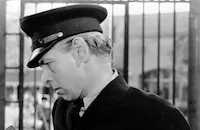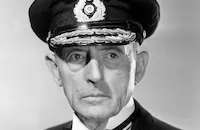Captured!

Brief Synopsis
Cast & Crew
Roy Del Ruth
Leslie Howard
Douglas Fairbanks
Paul Lukas
Margaret Lindsay
Robert Barrat
Film Details
Technical Specs

Synopsis
A prisoner in a World War I German prison camp for Allied soldiers starts a riot when he commits suicide. For punishment, all the men are confined to a cramped dungeon. Fred Allison, a captured British officer, begs fellow Oxford graduate Carl Erlich, the commandant of the camp, for the men's release, promising to be personally responsible for their behavior. Among a new batch of prisoners is Jack Digby, an old friend of Allison. Since Digby had seen Allison's wife Monica shortly before his capture, Allison questions him about her. He doesn't know that Digby and Monica have fallen in love, and Digby feels guilty about betraying his friend. Digby plans to escape although Allison begs him not to try because of the trouble it will cause for the other men. Digby ignores his pleas and escapes in a nearby plane the same night another soldier rapes and murders a young German woman. Believing Digby to be guilty of the crime, the Germans request his return. Erlich asks Allison to sign the request, and he initially refuses, but when he sees a letter from Monica to Digby in which she declares her love for him, he changes his mind and signs the request. At his trial, Digby accuses Allison of condemning him to death for having an affair with his wife. After Digby is sentenced to be shot, Allison finds a confession in his room from the guilty soldier, who has since committed suicide. Allison allows the execution to proceed until the last minute, when he reveals the real murderer and frees Digby. Allison then tells Digby that he has planned an escape for the entire camp. He mans a large gun, keeping the Germans at bay while the rest of the men escape in German planes. Digby returns to rescue Allison, but he is too late--Allison is dead. Erlich and Digby salute his corpse.

Director

Roy Del Ruth
Cast

Leslie Howard

Douglas Fairbanks

Paul Lukas

Margaret Lindsay

Robert Barrat

Arthur Hohl
John Bleifer
William Lemaire

J. Carroll Naish
Phillip Faversham

Frank Reicher
Joyce Coad
Bert Sprotte

Harry Cording

Halliwell Hobbs
Reginald Pasch
Hans Joby
Crew
Edward Chodorov
Lloyd Edwards
Leo F. Forbstein
Kenneth Green
Robert M. Haas
William Holmes
Fred Jackman
Larry Kennedy
Barney Mcgill
Orry-kelly
Dolph Thomas
William Whitley

Film Details
Technical Specs

Articles
Captured!
Leslie Howard had been a star of the stage for years but had steered clear of movies throughout the 1920s, the golden age of silent cinema. With the coming of sound, however, stage actors with strong, distinctive voices were in demand and in 1930 he was wooed by Hollywood to star in the screen version of the play Outward Bound. He had played the supporting role on stage in New York, but for the film he took the lead and Douglas Fairbanks, Jr., the son of Hollywood royalty and a rising young actor in his own right, took the supporting role that Howard had created onstage. The film was a financial disappointment but a critical success and a mark of prestige for Warner. It was also the beginning of a "hilarious and adventurous friendship off screen," as Fairbanks describes it in his autobiography, between Howard, the very English stage professional newly arrived in the movies, and Fairbanks, the son of the Hollywood action superstar. They shared the same Hollywood agent, Mike Levee, and both landed lucrative contracts with Warner Bros.
Howard preferred stage to screen and didn't think much of the quality of scripts he was getting. Captured! was "just another in a long line that helped to pay for the English house, and this was a very important reason for anything," wrote his daughter, Leslie Ruth Howard, in A Quite Remarkable Father. It did, however, provide a reunion for the two friends. As Fairbanks shared in his autobiography, "one compensation for being maneuvered into a so-so story was being co-starred with Leslie Howard again.... Leslie was bound to raise the film's standards and I would have my work cut out just to keep up with him in my performance."
Fairbanks gets second billing as Capt. Allison's best friend Lieutenant Fred Digby, a flier who lands in the camp after Allison has negotiated better conditions for the men with the new camp Commandant (Paul Lukas), an Oxford man like Allison. The dynamic in some ways anticipates Jean Renoir's La Grande Illusion (1937), with the two enemies finding common ground in class and education. Meanwhile the friendship between Allison and Digby is strained because of a Digby's determination to escape and because of a guilty secret he dare not share with Allison. "I failed to persuade Jack Warner that I preferred the American tough-guy parts that I had been getting away with," wrote Fairbanks in Salad Days. He was obliged to play a British character but next to the soft-spoken, cultured manner of Howard, he comes across as more of a can-do, emotionally-driven American.
Roy Del Ruth, a former gag man turned contract director in the silent era, flourished at Warner Bros. with the coming of sound and he became one of the most prolific and reliable directors in the studio stable in the 1930s, responsible for some of the snappiest and sassiest films of the pre-Code era, among them Blessed Event (1932), Employees' Entrance (1933), and the James Cagney films Blonde Crazy (1931), Taxi! (1932), and Lady Killer (1933). Captured! was largely shot on the Warner lot on a modest budget, making the camp more of a miniature suggestion of a sprawling location. Most of the action is contained in small spaces -- barracks, prison cells, offices -- and Del Ruth struggles to create tension and drama in a series of conversations without the energy of a James Cagney or a Lee Tracy to drive the dialogue.
To compensate, he set most of Captured! at night to create a shadowy, oppressive atmosphere. For reasons that work better dramatically than logically, the prison camp is situated next to a German airfield and the buzz of airplanes suggests the war outside the frame, torturing the men every night with the promise of escape just over the wire. Del Ruth saves his resources for the third act, which is filled with mob dynamics, brawling action, and a brutal machine-gun attack. For the finale, he went on location to a Glendale airfield and filled the screen with scores of biplanes and more than a thousand extras for a furious sequence shot at night. After the long build-up, Del Ruth lets loose and delivers a thrilling two-fisted finale.
Producer: Edward Chodorov
Director: Roy Del Ruth
Screenplay: Edward Chodorov (screenplay); Sir Philip Gibbs (story)
Cinematography: Barney McGill
Art Direction: Robert M. Haas
Music: Bernhard Kaun (uncredited)
Film Editing: William Holmes
Cast: Leslie Howard (Captain Fred Allison), Douglas Fairbanks, Jr. (Lieutenant Fred 'Dig' Digby), Paul Lukas (Colonel Carl Ehrlich), Margaret Lindsay (Monica A. Allison), Robert Barrat (The Commandant), Arthur Hohl (Cocky), John Bleifer (Strogin), William LeMaire (Joe 'Tex' Martin), J. Carroll Naish (Cpl. Guarand), Phillip Faversham (Lieutenant Haversham).
BW-69m.
by Sean Axmaker
Sources:
The Salad Days, Douglas Fairbanks Jr. 1988, Doubleday.
A Quite Remarkable Father, Leslie Ruth Howard. 1959, Harcourt, Brace and Company.
In Search of My Father, Ronald Howard. 1981, St. Martin's Press.

Captured!
Quotes
Trivia
The airplane escape sequence at the end used 75 biplanes and 1,500 people, and was filmed at night.
Notes
The film's pre-release title was Fellow Prisoners. A news item in Hollywood Reporter notes that an important scene was shot at night at the Grand Central Airport in Burbank using seventy-five airplanes and 1,500 people. According to production records included in the file on the film at the AMPAS Library, shooting lasted twenty-nine days and the film was made for a total cost of $245,000. A $25,000 suit was brought against Warner Bros. by Ferdinand Huszti Horvath charging that the use of the title Captured had rendered his book of the same title valueless. Horvath complained that the public had been misled into believing that the book, which he had previously submitted to the studio, had been filmed by Warner Bros. and thus the sale of his story to other studios had been prevented. The final resolution of the lawsuit has not been determined.















